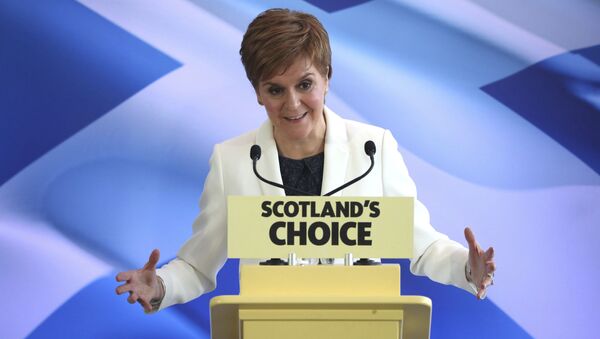As Scotland’s First Minister Nicola Sturgeon is set to address the opening day of the Scottish National Party (SNP) conference, she will tell activists she has "never been so certain" her country will achieve independence, writes The Scotsman.
Opening the three-day virtual gathering, Sturgeon will reportedly say that independence is now the “sustained and majority view” and that the nation is “on the cusp of making history”.
#SNP20 remote studio ready to go...see you all in the morning. pic.twitter.com/1gIFmm9Oi8
— Nicola Sturgeon (@NicolaSturgeon) November 27, 2020
"Independence is in clear sight - and with unity of purpose, humility and hard work, I have never been so certain that we will deliver it… The people of Scotland have the right to choose their future. Let's now focus all our efforts on making sure we bring about that better country they and future generations deserve. An independent future lies ahead - let's grasp it.”
The SNP won a "landslide victory" in Scotland in the UK general election last December, claiming 48 of the 59 available seats, and polling since the start of the year has shown that a majority of Scots are currently in favour of leaving the UK.
To everyone logging in to #SNP20 tomorrow, I look forward to seeing you there. This is our first ever remote conference - and so a bit strange for all of us - but I know we’ll have good debates as we prepare for next year’s @ScotParl elections and #indyref2
— Nicola Sturgeon (@NicolaSturgeon) November 27, 2020
Emboldened by the developments, Sturgeon will tell the conference:
“So this weekend, and over the next few months, let us reach out – to all of Scotland – like never before. Let us demonstrate – with cool heads and with patient persuasion – that Scotland is ready to take its place in the global family of independent nations.”
On Sunday, delegates are expected to formally debate the issue.
Interviewed by the BBC ahead of the conference, Nicola Sturgeon said a second independence referendum should be held "in the earlier part" of the next Scottish Parliament term.
While Sturgeon has been repeatedly urging the need for a second referendum, the UK government has refused to grant the consent that would be required for it to be rendered legal, with Prime Minister Boris Johnson ruling out the transfer of power through a Section 30 order.
The latter is a section of the Scotland Act that allows Holyrood - the seat of the devolved Scottish Parliament - to pass laws in areas that are normally reserved to Westminster.
According to Downing Street, the referendum result when voters were first questioned on the issue of Scotland’s independence in 2014 - when 55 percent were against it - still stands.
‘Highway to Independence’
Meanwhile, a leading MP from the SNP party has urged Sturgeon to press ahead with a second independence referendum. Joanna Cherry suggested the Scottish Government should allow the Supreme Court to decide on the issue in a subsequent legal challenge, if next year's Scottish parliamentary election results in a pro-independence majority.
At a Cardiff lecture, Cherry was cited by The Scotsman as saying:
"Scotland most certainly does not stand where she did – she is not so much at a crossroads as on a highway to independence.”
Cherry continued to insist that waiting on “good will and largesse from Boris Johnson” might be too lengthy a process.
The MP continued to explain that if pro-independence referendum parties were to obtain a majority at the Scottish election in 2021, while the PM continued to refuse to contemplate a second referendum, then Sturgeon ought to pursue the idea she floated earlier this year.
“It would require a carefully crafted bill to be piloted through Holyrood. Then, when the inevitable legal challenge came, it would be for the courts to decide whether the bill passed was within the competence of the Scottish Parliament and, thus, whether the referendum so authorised could proceed,” said Cherry.
Devolution ‘Disaster’
Amid the flaring tensions around the issue, Boris Johnson earlier came under fire for reportedly telling a virtual meeting of Conservative MPs that devolution had been a "disaster" in Scotland, describing it as his predecessor Tony Blair's "biggest mistake".
Johnson was in a Zoom meeting with Tory MPs representing seats in northern England when he is said to have made the remarks.
Worth bookmarking these PM comments for the next time Tories say they’re not a threat to the powers of the Scottish Parliament - or, even more incredibly, that they support devolving more powers. The only way to protect & strengthen @ScotParl is with independence. https://t.co/Hk7DqoFeuY
— Nicola Sturgeon (@NicolaSturgeon) November 16, 2020
In response to the torrent of criticism, a Downing Street spokesperson said in a statement that Johnson "has always supported devolution but he is at heart a unionist and he is very troubled by the rise of nationalism and separatism".
Ex-Prime Minister Tony Blair's Labour government brought in devolution for Scotland in 1999. The move stipulated the setting up of a parliament in Edinburgh, with devolution referring to the way powers once held by the government in Westminster have been passed to elected groups in Scotland, Wales and Northern Ireland.
These pertain to health, housing, fire services, some areas of transport and education. Scotland has always had its own education system and a separate legal system.
The UK government has retained powers such as defence, foreign policy and most forms of tax.
‘All Options on the Table’
Back in late 2019 Nicola Sturgeon made it clear in late 2019 that "all options" were on the table for Scotland to hold a second independence referendum.
"The question is often posed to me: 'what will you do if Boris Johnson says no?' As I've said before, I will consider all reasonable options to secure Scotland's right to self-determination", she said.


